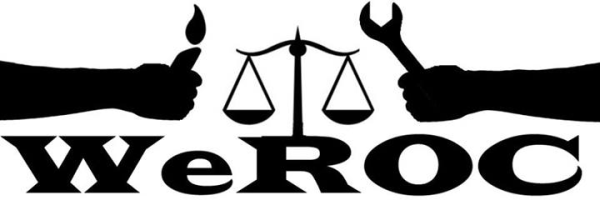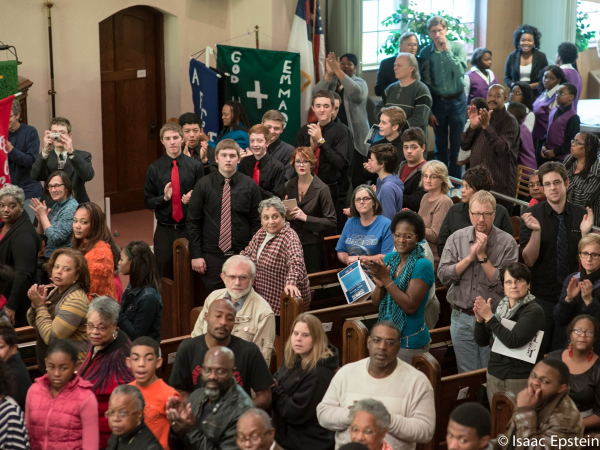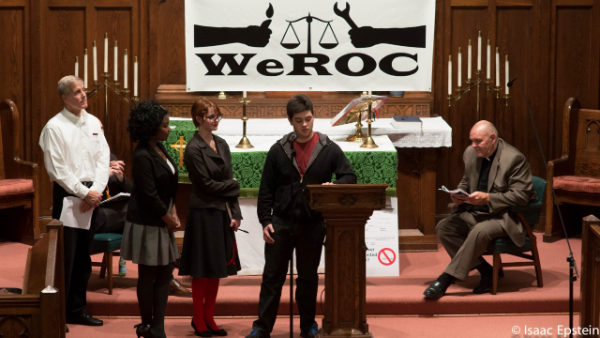They rock

[All photos by Isaac Epstein, used with permission]
In the spring of 2012, a handful of from various faith, labor, and community organizations began to meet to discuss building a local group to work on solving some of the intractable problem confronting their communities. Over time, that group swelled in size and became known as the Washtenaw Regional Organizing Coalition or “WeROC”.
This past Sunday, WeROC, in partnership with Detroit-based MOSES organization, held their first community meeting. WeROC has been focusing on three specific issues, issues chosen using the model best exemplified by MOSES’ parent organization, the Gamaliel Foundation. Using this model, issues are selected that come from a bedrock set of shared values, build sustainable coalitions, and for which success is achievable. WeROC is focused on eliminating fees for “7th hour” classes at Ann Arbor public schools which make them unavailable to students whose families are on limited incomes, the “Ban the Box” effort to remove questions about previous felony convictions from employment applications, and enhancing access to reliable and affordable transportation services to medical facilities around the county for patients without vehicles.
The event can be described as nothing short of a stunning success. Nearly 500 people packed the Emmanuel Lutheran Church in Ypsilanti to bring these issues to the forefront and to obtain public commitments from elected officials, organizations, and community leaders to work with WeROC to resolve these problems.

A full house at WeROC’s public meeting in Ypsilanti
For each of the three issues, a short introduction helped the meeting attendees to get a better understanding of what is at stake. Students from Ann Arbor public schools talked about the value and importance of the types of art, music, advanced placement, and other classes presented during the “7th Hour”, classes poor students are not able to access because of the “7th Hour” fee policy.

Students talk about the value of keeping Ann Arbor Public Schools “7th Hour”open for ALL students
A short role-playing skit described a young man who had served time in prison and, having paid his debt to society, was now unable to get a job because checking the box saying he had a prior conviction sent his application to the trash bin, ensuring that he would be unable to join the ranks of those earning a living and contributing to society.

WeROC organizer Rod Casey points to “the box” which consigns prior offenders to a life of being unemployed
A short picture slideshow showed how Waldo, represented by a cardboard cutout, left 2 hours before his diabetes treatment at Dominos Farms and, using public transportation, was still 15 minutes late for his treatment because of the unreliability of the public transit system. He was unable to obtain his treatment because of it and the skit was a powerful demonstration of the failure on the part of the Ann Arbor Area Transit Authority and University of Michigan Health Services to coordinate this service and make it work for Washtenaw County residents without transportation.
In each instance, representatives from the groups involved and elected officials came to the front of the room and were asked to make a public commitment to help solve these problems. With the notable exception of the University of Michigan Health System who declined to participate, every group had a representative who made a vow in front of several hundred community members to work with WeROC to resolve the issue.
The coalition that WeROC has assembled is showing how, when we work together toward common goals, community members who often feel powerless are empowered to effect significant positive change in their communities. The room was packed with a diverse collection of citizens, elected officials, community leaders, and organizational representatives, all sharing a common interest in making Washtenaw County a better place for everyone.
WeROC volunteer organizer Tad Wysor, in describing WeROC’s efforts, told me, “We don’t have to solve these problems ourselves. What we’re doing is engaging the individuals and organizations who CAN solve these problems and getting them to make a public commitment to do so.

Tad Wysor wraps up a very successful WeROC public meeting
To find out how you can get involved in this exciting and effective group, visit WeROC’s Facebook page: Facebook.com/werocMI. There you can learn more about the issues they are working on and find out the times/dates/locations of their upcoming meetings. During a time when many of us feel powerless to make a difference in the world around us, WeROC is showing that, by working together from a basis of shared values, individuals CAN be powerful and they CAN make a difference.
You can learn more about the Gamaliel Foundation’s positive approach to obtaining and using power for good in my post titled “I Want POWER and I Will Be Ruthless”.



